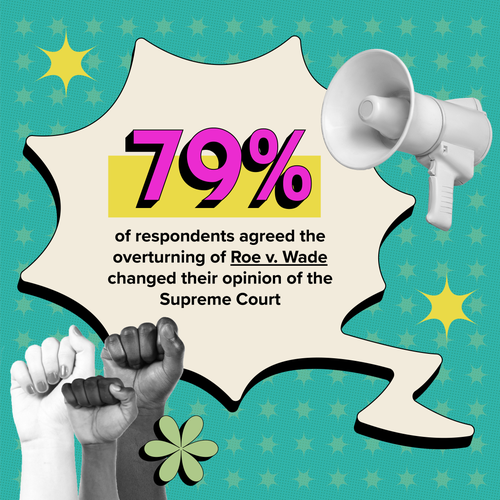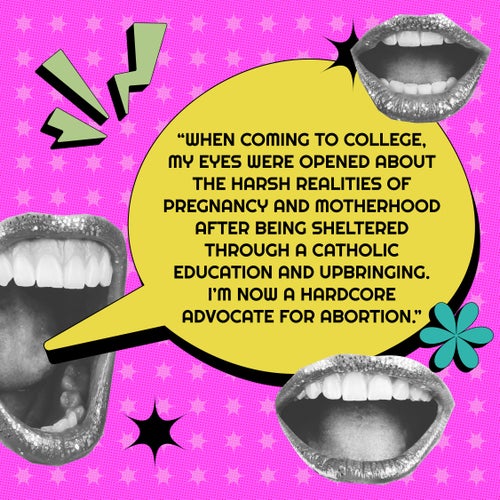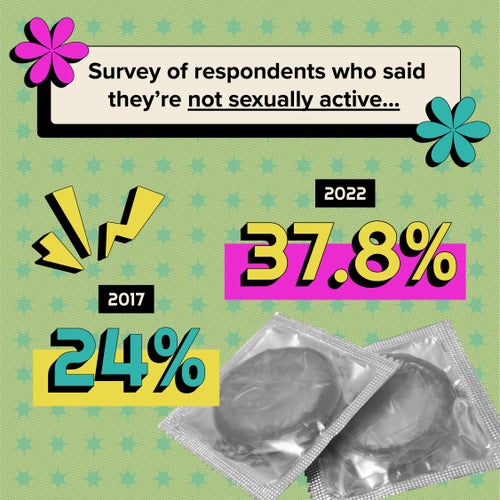Gen Z is by and large considered a “pro-choice generation.” But with Roe v. Wade overturned and abortion policy at the forefront of many voters’ minds ahead of the 2022 midterm elections, we at Her Campus sought to dig deeper into Gen Z’s feelings about abortion, reproductive rights and policies, and birth control. We explored these issues in depth five years ago, too, in our 2017 Our Bodies, Our Rules project. It was conducted at another pivotal time in the history of reproductive rights — when Donald Trump was elected president.
To learn more about how this generation feels about reproductive rights issues today, Her Campus surveyed 1,115 Gen Zers from August through September 2022, 70.8% of whom are currently enrolled in college, and the majority of whom (almost 95%) are female.
This is where Gen Zers stand on abortion, birth control, and reproductive health care. They told us what they believe, how those beliefs have shifted from 2017 to 2022, and what they hope for the future of their governments, campuses, and communities.
Abortion
Here’s the big statistic you’re probably looking for: 89.4% of survey respondents were pro-abortion, compared to 7.8% who were anti-abortion (1% don’t have a stance, and 1.8% said “Not sure”). We found a major uptick in pro-abortion sentiment compared to the 2017 survey, in which just 75% of respondents considered themselves “pro-choice” and 21% considered themselves “pro-life.” So the labeling of Gen Z as a “pro-choice” generation is pretty accurate — they know their views, and for the most part, they’re sticking to them.
In fact, those who took the survey in 2022 were slightly less likely to have changed their viewpoint on abortion over time than the 2017 respondents (16.6% to 20%). For those people in 2022 who did change their minds, though, the largest percentage went from being anti-abortion to being pro-abortion (12.5% of all respondents).
Many of our survey respondents pointed to the start of college as a turning point for their views on reproductive rights. One 19-year-old respondent said, “When coming to college, my eyes were opened about the harsh realities of pregnancy and motherhood after being sheltered through a Catholic education and upbringing. I never took into account or was told of these harsh realities, I was just told abortion was wrong and that was it. I’m now a hardcore advocate for abortion and have conversations with others about my views, and am comfortable sharing how I came to my conclusions about abortion and birth control.”
As for where Gen Zers’ views on abortion stem from, survey results don’t definitively point to one answer. When asked if their parents or the people who raised them share their view on abortion, only about half of respondents (53.6%) were in clear agreement with their parents. Less than a quarter (21.7%) were pro-abortion while their parents or guardians were anti-abortion, and 18.1% weren’t even sure of their parent’s or guardian’s viewpoint. It’s not clear, then, how many Gen Zers are having discussions about abortion with their parents, or what those discussions look like, especially with some college students shifting their opinions once they leave home for college.
Religion also can’t be pointed to as a clear answer for Gen Z’s stance on abortion: Over a third (36.2%) of respondents said they aren’t even religious, while 41% of all respondents said their religious views don’t influence their stance on abortion. So while the overturning of Roe v. Wade (and specifically the role of the Supreme Court in abortion policy) is often tied to the religious right in the media, these religious justifications for anti-abortion sentiment are only true for a small minority among Gen Z (5.7% of total respondents). In fact, almost double that amount — 10.2% of all respondents — said that their religious views are part of the reason they’re pro-abortion, indicating a major discrepancy between Gen Z’s views and the views of the Supreme Court.
Gen Zers are also feeling the urgency of securing abortion rights now, after Roe v. Wade was overturned in June 2022. Many people who took the survey have gotten involved in activism and the conversation around abortion. A majority (60.2%) of respondents said they posted about abortion resources on social media, 27.2% donated to an abortion fund, 21.4% called or emailed their representatives, and 14.2% attended in-person protests. The fact that so many Gen Zers felt inclined to take action online indicates that social media in particular may be a key resource in the spread of information about reproductive justice for Gen Z.
Respondents were also asked if they felt they’d be safely able to obtain an abortion if they wanted or needed one. Many of their answers depended on the state they lived in and those states’ individual policies, with common answers like, “Yes, because I live in New York,” or, “No, I would have to travel to another state.”
On campus, students may be looking to their schools to assist them with reproductive health care needs, but those needs don’t seem like they’re being met. A whopping 75% of respondents didn’t know if their school’s health center provides access to medication abortion, and an overwhelming majority of open-ended answers similarly pointed to a lack of knowledge about what support, if any, their school or campus provides to students seeking abortions. “If there is, I haven’t heard about it,” one respondent wrote.
That doesn’t mean that students aren’t seeking help from their schools, however. When asked what support they would like to see from their schools or campuses, some of the most common answers from respondents included counseling, the general spread of information about students’ options, where to access care, increased access to birth control, and safety and privacy for patients. The conversation around school health centers’ role in providing reproductive healthcare resources will likely spark more discussion among college students, as it already has in some states.
Reproductive Rights and Policies
In the survey, questions about abortion policy were some of the most divisive for respondents. They were mostly in agreement about whether they supported overturning Roe v. Wade (88.2% opposed it) and whether reproductive rights are an important political issue (87% rank it as one of their top political priorities). We may see these views in action at the polls on Election Day: 86.5% agreed that their views on abortion would affect their votes in upcoming elections, like the November midterms. In fact, five states have abortion rights on the ballot in the midterm elections. If the majority of Gen Zers ready to vote in favor of abortion, as the survey suggests, that could lead to some major protection of abortion rights in those states’ constitutions.
But when it comes to other areas of reproductive healthcare policies, the near-unanimity seems to stop. When asked who should have a role in deciding abortion policy — the president, Congress, the Supreme Court, individual states, or none of the above — over half (58.6%) answered none of the above. In other words, they want abortions to be personal decisions. That’s actually lower than the 2017 results, where 67% of respondents believed the government shouldn’t have a say in whether people can have abortions. This could mean that more young people want some kind of policy in place to protect their rights, but they’re still not particularly trusting of any one government institution.

For those who do want government involvement of some kind, Gen Z seems pretty split on exactly who. The remaining categories saw pretty even results: 18.7% for the president, 24.9% for Congress, 20% for individual states, and 16.2% for the Supreme Court.
Similarly, the Supreme Court was a divisive subject for survey-takers. In their open-ended answers, many respondents expressed anger toward the court. “I used to believe the Supreme Court was a just group,” one participant said. “I believe they are no longer representative of the people nor are [they] the representative[s] of our laws and Constitution. I believe they are religious extremists who want to dictate this country based on their religious beliefs and ideologies.”
While 79% of respondents agreed that the overturning of Roe v. Wade changed their opinion of the Supreme Court, they weren’t so sure about what the future of the court should look like. A majority (76.3%) said they support term limits on Supreme Court justices, and separately, 56.1% said they support expanding the Supreme Court to have more than nine justices. But respondents were most divided on whether or not they support abolishing the Supreme Court altogether. Almost 39% said no, about a quarter (26.5%) said yes, and 35.1% said they didn’t know. Considering the discrepancy between the Court’s view on abortiton versus Gen Z’s, Gen Z knows they want something about the Supreme Court to change, but may be a bit lost as to how to improve a system that is enshrined in American history and government.
Birth Control
You may have heard about Gen Z’s so-called “sex recession” over the past few years. But how accurate is the assumption that Gen Z is having less sex? Well, over a third of survey respondents said they’re not sexually active — 37.8%, compared to the 62.2% who are. That’s a sharp increase from the 2017 survey results, in which only 24% of respondents reported not being sexually active.
But the differences in sexual activity aren’t deterring Gen Z from taking birth control, since 76.2% of all respondents are taking it. As many respondents pointed out in their open-ended answers, sex isn’t the only reason to be on birth control, with one person saying, “Birth control … helps relieve menstrual cramps and endometriosis symptoms, acne, helps with PCOS (polycystic ovarian syndrome), lowers the risk of ectopic pregnancies and certain cancers. … I hope in the future, education on birth control is more openly accessible to people, and maybe even a name change [would help], because people seem to understand that birth control is really all that it is there for.”
There’s also more variation in birth control methods now than there was in 2017. The 2017 results found that 68% of respondents used condoms, 56% used the pill, 8% used the hormonal IUD, and less than 4% used other methods. External condoms and the pill are still the most popular among 2022 respondents — at 41.3% and 40.1%, respectively — but only about 7% reported using a hormonal IUD, and 16.1% used other methods including but not limited to the arm implant, sponge, spermicide, copper IUD, vaginal ring, injection, and the patch.
Convenience seems to be top of mind for many survey respondents — over half (53.3%) chose their current method of birth control because it’s the most convenient, though that’s lower than the 60.5% who had the same reason in the 2017 survey.
Affordability also seems to be a concern for young people on birth control. About a quarter of 2022 respondents (24.6%) chose their current method of birth control because it’s the most affordable option. And compared to 2017, a higher percentage of 2022 respondents think birth control should be offered for free as part of everyone’s health insurance plan — about 93% compared to the 83% who thought so five years ago. This could be due to heightened financial anxiety among Gen Z, and a desire for security around their medical needs. And where about 60% thought birth control should be available over the counter without a prescription in 2017, that number jumped to 77.2% this year.
As for where respondents are accessing information about their birth control options, a majority (63.1%) pointed to their OBGYN, and almost 36% to their primary care doctor. That’s not all, though: 36% of respondents also accessed birth control information from social media, 41% from friends, and 31.8% from family members.
So many Gen Zers turning to personal connections or solo online research for guidance could indicate a general lack of knowledge about birth control options. Many respondents wrote in their open-ended answers about a desire for the normalization of education about birth control.
Gen Z is not a monolith — the participants of this survey gave a wide range of answers and opinions, and weren’t in total agreement about any one topic. But one thing is true: This generation needs support to navigate the future of reproductive rights in the United States, which is exactly what our Our Bodies, Our Rights project aims to do.
Read the rest of the Her Campus Our Bodies, Our Rights project here.




